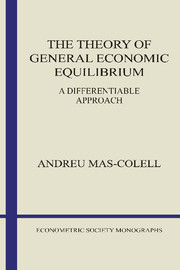5 - Exchange economies
Published online by Cambridge University Press: 05 January 2013
Summary
Introduction
In this and the next chapter an extensive account is given of the Walrasian price equilibrium theory of exchange and production. In comparison to the previous chapter, the key new element is that consumers are now characterized not only by their preferences but also by their initial endowments of commodities. To streamline the exposition, the present chapter concentrates on economies without production, whereas the next goes into any distinct issue raised by the latter.
Section 5.2 presents the basic definitions of consumers, exchange economies, and exchange price equilibrium. This is done both for the general and the smooth case. Different systems of equations whose zeroes describe the equilibrium state are presented. One, the excess uitility map, is in the spirit of the previous chapter. We shall nevertheless emphasize an approach via excess demand functions. This is done partly because situations with a continuum of consumers can be accommodated at almost no cost.
Placing ourselves in a smooth framework, Section 5.3 presents the central concept of regular economy. Roughly speaking, an economy is regular if the relevant systems of equations, for example, the excess demand function, is not (first-order) degenerate, that is, singular, at equilibrium. In Section 5.8 and more deeply in chapter 8, we shall argue that, in a precise sense, nonregular economies are pathological. At any rate, it is for regular economies that the full power of the differentiate approach can be displayed. Thus, for example, the equilibria of a regular economy are well determined in the sense of being locally unique and persistent under perturbations of the economy. This is shown in Section 5.4 by an implicit function theorem argument that amounts, in essence, to the verification that the number of equations and unknowns is the same. Regular economies turn out thus to be the proper setting for the rigorous application of this classical technique.
- Type
- Chapter
- Information
- The Theory of General Economic EquilibriumA Differentiable Approach, pp. 166 - 244Publisher: Cambridge University PressPrint publication year: 1985



